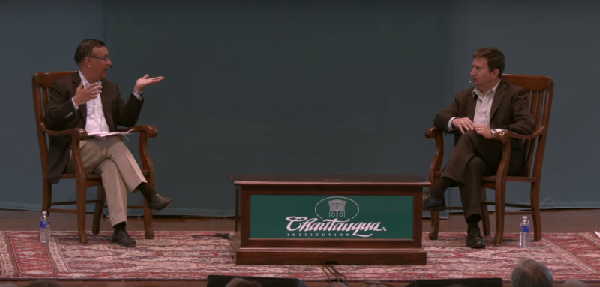The reversal of Maugham’s Samarra
Tuesday, May 10th, 2016[ by Charles Cameron — how British and American literature, a Talmudic tale and a Sufi teaching story conspire — twice — to illuminate current events in Iraq and Syria ]
.
Let’s start with Somerset Maugham‘s telling of the Appointment in Samarra, which John O’Hara borrowed as the epigraph of his novel by that name:
The speaker is Death
There was a merchant in Bagdad who sent his servant to market to buy provisions and in a little while the servant came back, white and trembling, and said, Master, just now when I was in the marketplace I was jostled by a woman in the crowd and when I turned I saw it was Death that jostled me. She looked at me and made a threatening gesture, now, lend me your horse, and I will ride away from this city and avoid my fate. I will go to Samarra and there Death will not find me. The merchant lent him his horse, and the servant mounted it, and he dug his spurs in its flanks and as fast as the horse could gallop he went. Then the merchant went down to the marketplace and he saw me standing in the crowd and he came to me and said, Why did you make a threating getsture to my servant when you saw him this morning? That was not a threatening gesture, I said, it was only a start of surprise. I was astonished to see him in Bagdad, for I had an appointment with him tonight in Samarra.
**
Here’s the version of the same story found in the Babylonian Talmud, Tractate Sukkah 53a:
R. Yohanan stated: A man’s feet are his guarantors? they lead him to the place where he is wanted. There were once two Cushites who attended on Solomon, and these were Elihoreph and Ahyah, the sons of Shisha, scribes, of Solomon (I Kings 4:3). One day Solomon observed that the Angel of Death was distressed. He asked him: Why are you distressed? He responded: They have demanded from me the two Cushites who sit here. [Solomon] gave them over to the demons and sent them to the district of Luz. When they reached the district of Luz they died. On the following day he observed that the Angel of Death was smiling He said to him: Why are you smiling? He responded: To the place where they expected them from me, there did you send them!’ Solomon immediately began to say: A man’s feet are his guarantors? they lead him to the place where he is wanted.
**
In February 2014 in the US Jewish magazine Forward, writer JJ Goldberg made fine use of this tale, applying it to a then-contemporary news event in his piece, Lesson of the Talmud in an Iraq School Suicide Bombing:
School massacres have become so commonplace that they scarcely shock us anymore. And yet, occasionally mayhem invades the sanctity of the classroom in a way that can still puncture our complacency. At these moments we’re reminded how fragile is this thing we call civilization. Such was the case February 10 in a rural schoolroom outside Samarra in north-central Iraq, where a terrorism instructor teaching a class in suicide bombing accidentally detonated a live explosive belt. Twenty-one students died along with their teacher. It happened in a training camp run by the Islamic State of Iraq and Syria, the Sunni terrorist group that was recently expelled from Al Qaeda for, of all things, its excessively brutal extremism in the Syrian civil war. [ .. ]
The location of the suicide school in Samarra has layers of poetic resonance, probably unintended by ISIS. Though predominantly Sunni, the city is revered by Shi’ites as the place where the last caliphs are buried and the Mahdi disappeared. Its name resonates in medieval Islamic lore with mysteries of suicide and predestined death, echoed in modern Anglo-American literature and linked to Talmudic legend.
After discussing the Talmudic and Maugham versions, Goldberg concludes:
Thus, the lesson of Samarra. In Arabic lore, we’re drawn helpless to our predestined deaths. In the Talmud, it’s kings who dispatch us with the best intentions to what they assume will be a cakewalk, but it’s we — or, per the Talmud, the king’s black soldiers — who do the dying.
**
The Afghan Sufi writer Idries Shah tells the story in his brilliant little book Tales of the Dervishes, under the title When Death Came to Baghdad:
The disciple of a Sufi of Baghdad was sitting in the corner of an inn one day when he heard two figures talking. From what they said he realized that one of them was the Angel of Death.
“I have several calls to make in this city during the next three weeks,” the Angel was saying to his companion.
Terrified, the disciple concealed himself until the two had left. Then applying his intelligence to the problem of how to cheat a possible call from death, he decided that if he kept away from Baghdad he should not be touched. From this reasoning it was but a short step to hiring the fastest horse available and spurring it night and day towards the distant town of Samarkand.
Meanwhile Death met the Sufi teacher and they talked about various people. “And where is your disciple so-and-so?” asked Death.
“He should be somewhere in this city, spending his time in contemplation, perhaps in a caravanserai,” said the teacher.
“Surprising,” said the Angel; “because he is on my list. Yes, here it is: I have to collect him in four weeks’ time at Samarkand, of all places.”
Shah attributes his telling thus:
This treatment of the Story of Death is taken from Hikayat-iNaqshia (Tales formed according to a design’).
The author of this story, which is a very favourite folklore story in the Middle East, was the great Sufi Fudail ibn Ayad, a former highwayman, who died in the early part of the ninth century.
**
All of which brings me to this Kurdish news story published yesterday, ISIS captive begs Peshmerga to kill him for 4 o’clock appointment
DUHOK, Kurdistan Region — An Islamic State (ISIS) militant caught in fighting near Mosul last week begged his Peshmerga captors to shoot him dead on the spot so he could reach paradise the same day, a frontline Kurdish soldier said.
“The militant’s own suicide vest had failed to explode but he had sustained injuries from his friends’ vest explosions,” Peshmerga Captain Salim Surchi of the Spilk base told Rudaw. “He kept saying, ‘kill me, you infidels kill me.’” Cpt. Surchi said the militant was captured by the Peshmerga during last week’s fighting in the Christian town of Tel Skof, 28km north of Mosul. The militant was eager to be killed on the spot because it was a holy Islamic day known as Isra an Mi’raj, the day that marks Prophet Muhammad’s ascension to heaven as mentioned in the Koran. [ .. ]
Cpt. Surchi lost three of his close friends that day and had others wounded, he said, but he still rushed to help a wounded ISIS militant to save his life. “I was filming the dead ISIS with my cell phone when I saw one of them moving his leg and I placed my hands on his chest trying to help him breathe,” the Peshmerga commander said of the moment following the fighting. “He breathed heavily a few times, he was conscious and he could even speak,” he added. Cpt. Surchi said that despite the militant’s pleas to be shot dead, he went ahead and treated his leg wound.
“When I was treating him I asked, ‘where’re you from?’ and he said, ‘I’m from Samarra and came here for jihad.’ The militant then said, ‘We were 50 suicide bombers altogether and we wanted to be in paradise by 4 o’clock in the afternoon,” Cpt. Surchi recounted. [ .. ]
“The wounded one kept asking us to kill him till the end of the day.”
Which in turn brings us full circle. In Maugham’s telling, our traveller makes his way to Samarra to avoid death, who finds him there. In yesterday’s version, the jihadist leaves Samarra to meet his death, who refuses, on the night of all nights, to oblige him.





